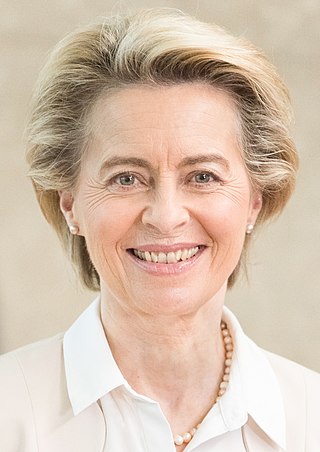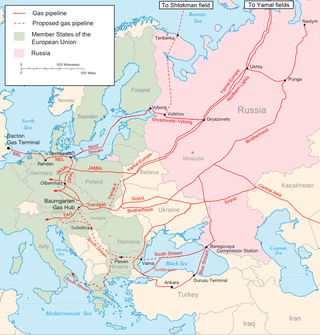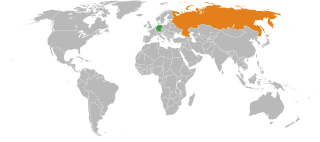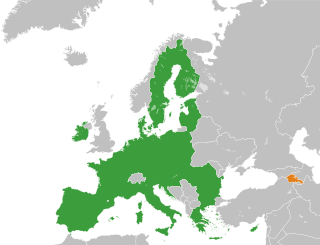Related Research Articles

Reliance Industries Limited is an Indian multinational conglomerate, headquartered in Mumbai. It has diverse businesses including energy, petrochemicals, natural gas, retail, telecommunications, mass media, and textiles. Reliance is one of the most profitable companies in India, the largest publicly traded company in India by market capitalisation, and the largest company in India as measured by revenue. It is also one of the largest employers in India, with over 300,000 employees in the world.

Ursula Gertrud von der Leyen is a German politician who has been serving as the president of the European Commission since 2019. She served in the German federal government between 2005 and 2019, holding successive positions in Angela Merkel's cabinet, most recently as minister of defence. Von der Leyen is a member of the centre-right Christian Democratic Union (CDU) and its EU counterpart, the European People's Party (EPP).

The Russia–Ukraine gas disputes refer to a number of disputes between Ukrainian oil and gas company Naftogaz Ukrayiny and Russian gas supplier Gazprom over natural gas supplies, prices, and debts. These disputes have grown beyond simple business disputes into transnational political issues—involving political leaders from several countries—that threaten natural gas supplies in numerous European countries dependent on natural gas imports from Russian suppliers, which are transported through Ukraine. Russia provides approximately a quarter of the natural gas consumed in the European Union; approximately 80% of those exports travel through pipelines across Ukrainian soil prior to arriving in the EU.

Russia–European Union relations are the international relations between the European Union (EU) and Russia. Russia borders five EU member states: Estonia, Finland, Latvia, Lithuania and Poland; the Russian exclave of Kaliningrad is surrounded by EU members. Until the radical breakdown of relations following the 2022 Russian invasion of Ukraine, the EU was Russia's largest trading partner and Russia had a significant role in the European energy sector.

Germany–Russia relations display cyclical patterns, moving back and forth from cooperation and alliance to strain and to total warfare. Historian John Wheeler-Bennett says that since the 1740s:

Relations between the European Union (EU) and Ukraine are shaped through the Ukraine–European Union Association Agreement and the Deep and Comprehensive Free Trade Area (DCFTA). Ukraine is a priority partner within the Eastern Partnership and the European Neighbourhood Policy (ENP). The EU and Ukraine have been seeking an increasingly close relationship, going beyond co-operation, to gradual economic integration and deepening of political co-operation. On 23 June 2022, the European Council granted Ukraine the status of a candidate for accession to the European Union.

Russia–Slovenia relations are foreign relations between Russia and Slovenia. Both countries established diplomatic relations on May 25, 1992. Russia has an embassy in Ljubljana. Slovenia has an embassy in Moscow and two honorary consulates. Until 2022, Russia had five honorary consuls in Slovenia, but Slovenia withdrew its consent to the appointments due to the Russian invasion of Ukraine. Both countries are full members of the Council of Europe and the Organization for Security and Co-operation in Europe.
RTR-Planeta is the international service of VGTRK, a state-owned broadcaster in Russia. It is available throughout the world via cable and satellite.

Russia supplies a significant volume of fossil fuels to other European countries. In 2021, it was the largest exporter of oil and natural gas to the European Union, (90%) and 40% of gas consumed in the EU came from Russia.

On 28 February 2022, shortly after it was invaded by Russia, Ukraine applied for membership of the European Union (EU). Ukrainian President Volodymyr Zelenskyy requested immediate admission under a "new special procedure", and the presidents of eight EU states called for an accelerated accession process. European Commission president Ursula von der Leyen stated that she supports Ukrainian accession, but that the process would take time. On 1 March 2022, the European Parliament recommended that Ukraine be made an official membership candidate, and on 10 March 2022, the Council of the European Union asked the commission for its opinion on the application. On 8 April 2022, von der Leyen presented Zelenskyy with a legislative questionnaire, which Ukraine responded to on 9 May.
International sanctions have been imposed against Russia and Crimea during the Russo-Ukrainian War by a large number of countries, including the United States, Canada, the European Union, and international organisations following the Russian annexation of Crimea, which began in late February 2014. Belarus has also been sanctioned for its cooperation with and assistance to Russian armed forces. The sanctions were imposed against individuals, businesses, and officials from Russia and Ukraine. Russia responded with sanctions against several countries, including a total ban on food imports from Australia, Canada, Norway, Japan, the United States, and the EU.

Robert Habeck is a German politician and writer who has been serving as Vice Chancellor of Germany, Federal Minister for Economic Affairs and Climate Action in the cabinet of Chancellor Olaf Scholz and as a Member of the German Bundestag for Flensburg – Schleswig since 2021. From 2018 to 2022, he also served as co-leader of Alliance 90/The Greens, alongside Annalena Baerbock. For the 2021 German federal election, he was a member of the leading duo, alongside Baerbock, who ran for chancellor of Germany.

The 2018 Brussels Summit of the North Atlantic Treaty Organization (NATO) was the 29th formal meeting of the heads of state and heads of government of the North Atlantic Treaty Organization, held in Brussels, Belgium, on 11 and 12 July 2018.
The 2021–2023 global energy crisis began in the aftermath of the COVID-19 pandemic in 2021, with much of the globe facing shortages and increased prices in oil, gas and electricity markets. The crisis was caused by a variety of economic factors, including the rapid post-pandemic economic rebound that outpaced energy supply, and escalated into a widespread global energy crisis following the 2022 Russian invasion of Ukraine. The price of natural gas reached record highs, and as a result so did electricity in some markets. Oil prices hit their highest level since 2008.

The economic impact of the 2022 Russian invasion of Ukraine began in late February 2022, in the days after Russia recognized two breakaway Ukrainian republics and launched an invasion of Ukraine. The subsequent economic sanctions have targeted large parts of the Russian economy, Russian oligarchs, and members of the Russian government. Russia has responded with sanctions of its own. Both the conflict and the sanctions have had a strongly negative impact on the world economic recovery during the COVID-19 recession. As a result of its war, estimates of a 30-year economic setback are projected for Russia. A wave of protests and strikes have occurred across Europe against the rise of bills and living expenses.
Following Russia's invasion of Ukraine beginning on 24 February 2022, the United States, the European Union, and other Western countries introduced or significantly expanded sanctions covering Russian President Vladimir Putin and other government members, and banned "selected Russian banks" from using the SWIFT international payments system, triggering the 2022 Russian financial crisis and a massive international boycott of Russia and Belarus, which supports the invasion.

The Russia–EU gas dispute flared up in March 2022 following the invasion of Ukraine in late February. Russia and the major EU countries clashed over the issue of payment for pipeline natural gas exported to Europe by Russia's Gazprom. In June, Russia cut the flow of gas by more than half, in July it stopped and resumed it, and in September it stopped it altogether. On 26 September 2022, the Nord Stream 1 and 2 gas pipelines both ruptured with evidence of sabotage.
Stop Bloody Energy project is a global initiative of Ukrainian energy companies aimed at refusing to buy Russian energy resources and cooperating with Russia in the energy sector due to its war against Ukraine. The project was launched by Rinat Akhmetov's private company DTEK and the state-owned companies Naftogaz and Ukrenergo.
The SWIFT ban against some Russian banks is one of the 2022 sanctions against Russia imposed by the European Union and other western countries, aimed at weakening the country's economy to end its invasion of Ukraine by hindering Russian access to the SWIFT financial transaction processing system.

The European Union Monitoring Capacity to Armenia (EUMCAP) was a European Union civilian deployment in the territory of the Republic of Armenia that was agreed on 6 October 2022 and officially became operational on 20 October 2022. The EUMCAP completed its mandate on 19 December 2022 at which point it was superseded by a European Union Planning Assistance Team in Armenia in preparation of a possible longer term mission in the country.
References
- ↑ McGrath, Matt (8 March 2022). "Climate change: EU unveils plan to end reliance on Russian gas". BBC News .